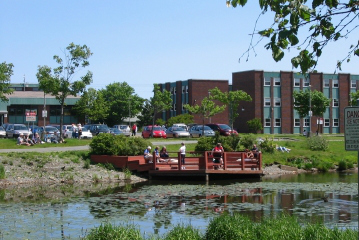Study in Newfoundland and Labrador
An increasing number of international students are studying in Newfoundland in order to develop their careers.
Studying in Newfoundland (also known as "The Rock") is primarily focused on courses that relate to the local economy, which is good news for individuals with an eye on trades, maritime, and natural resource professions. Higher education in Newfoundland is primarily centred in the beautiful city of St. John's.

Got a question about studying in Newfoundland and Labrador? Our comprehensive Studying in Newfoundland and Labrador FAQ page has the answers. If your question is not included, please contact us today and submit your question.
Population
530,000
International Student Population
2,088 (2014 figures)
Location

Main Study Destinations
St. John's, Stephenville
Studying in Newfoundland: The Advantages
Transition into the local economy
Students who study at undergraduate or graduate level in Newfoundland may give themselves a launching pad into some lucrative in-demand professions in the province, which has experienced an energy and resources boom since the turn of the century.
Low tuition fees
Just over a decade ago, Newfoundland and Labrador political leaders decided to swim against the nationwide tide of university funding cuts by reducing tuition fees and then freezing them. Government funding makes up around 85 per cent of the budget of the province’s only university, Memorial University, with the remainder coming from tuition. This has been a major selling point for bringing people into the province to study, not only from other provinces in Canada, but also internationally.
Experience life on "The Rock"
Newfoundland has a unique culture and a proud history. Local people, often known as "Newfies", are renowned for giving a special welcome to newcomers to their province. In Newfoundland, you may find peace, tranquility, and opportunity.
Immigrate After Studying in Newfoundland
Newfoundland and Labrador Provincial Nominee Program: International Graduate Category
The government of Newfoundland and Labrador is looking to welcome the best and brightest to its shores. Consequently the Newfoundland And Labrador Provincial Nominee Program (NLPNP) has an International Graduate Category, through which international students who have graduated from a recognized post-secondary educational institution in Canada can considered for nomination for permanent residence in Canada.
Atlantic International Graduate Program
The Atlantic International Graduate Program (AIGP) allows international graduates of eligible educational institutions in Atlantic Canada to submit an application for permanent residence without first having to obtain work experience. The AIGP is part of the Atlantic Immigration Pilot Program (AIPP), a new Canadian immigration venture for 2017 and beyond.
Express Entry
Candidates for immigration to Canada through the federal Express Entry immigration selection system who have completed their education at a school in Newfoundland may be awarded a significant number of points on account of their high level of education. Moreover, international graduates of Canadian educational institutions may have obtained important Canadian work experience, another highly valued factor under the Express Entry system.
Destination Schools in Newfoundland
These institutions are featured due to their size, proximity to urban centres, and tradition for enrolling international students into their student bodies. Learn more about each school by clicking their titles below, which will take you to the relevant page on School Search.
Memorial University of Newfoundland
Memorial University of Newfoundland is one of the top comprehensive universities in Canada. With a wide breadth of academic offerings and more than 18,000 students, it is also the largest university in Atlantic Canada.
Signature programs: Maritime Studies, Marine Management, Engineering, Physics and Physical Oceanography, Business Administration
Location: St. John's (additional campus in Corner Brook)

College of the North Atlantic
CNA graduates enjoy a higher percentage of employment in high-paying jobs specific to their field of study than other post-secondary institutions in the region. It also has the lowest tuition fees in Atlantic Canada of any post-secondary school.
Signature programs: Academics, Applied Arts Business Studies, Health Sciences, Engineering Technology, Industrial Trades, Information Technology, Tourism, Natural Resources
Location: Stephenville

In order to apply for a Canadian study permit, prospective international students must first obtain a letter of acceptance from a Designated Learning Institution (DLI). As each institution may have different admission requirements and application processes, interested applicants may contact the desired institution(s) individually. Find out more about studying in Newfoundland and Labrador.
For a full list of DLIs by province, click here.
Memorial University of Newfoundland is the province’s one university. Often known simply as MUN, the university has a well-known tradition of learning by doing. As the school is located on the edge of the North Atlantic, that often means training and research in cold oceans and other harsh environments. More than 18,500 full and part time students attend Memorial in both undergraduate and graduate studies, at four campuses including facilities in Essex, England. Memorial employs more than 2,200 faculty and staff and offers more than 100 degree programs through six faculties and six schools.
- Signature programs: Maritime Studies, Marine Management, Engineering, Business Administration
- The College of the North Atlantic is the province’s largest publicly-funded college. With more than 17 campuses across the province — and one campus in the gulf country of Qatar — College of the North Atlantic teaches and trains more than 25,000 students per year in almost 100 programs. Curricula are built around industry standards, and the college boasts some of the lowest tuition and highest graduate employment rates in the Atlantic Provinces.
- Signature programs: Business Administration and Management, Health Informatics, Engineering Technology, Tourism and Hospitality
- Newfoundland and Labrador also hosts a number of private career colleges, which operate under the supervision of the Department of Education. A career college is a private institution that offers career-focused study programs, often in skilled trades. Prospective international students should note that certain diplomas at career colleges do not make the holder eligible for a Post-Graduation Work Permit.
- Maritime studies are a speciality in Newfoundland and Labrador, largely due to the province’s geography and industry.
- Memorial University of Newfoundland hosts the Maritime Training Centre, which is known for its expertise in maritime studies, marine management, and related environmental and engineering programs. It offers graduate programs in marine studies (including fisheries and resources management, and marine spatial planning and management) and maritime management, as well as undergraduate courses in oceanography.
- Other specialized Natural Resources programs are popular, at both the Memorial University of Newfoundland and the College of the North Atlantic.
- In addition to the programs above, institutions across Newfoundland and Labrador offer a broad range of programs.
- International students at Memorial University of Newfoundland may expect to pay around $8,800 per year, although some study programs are more expensive.
- College tuition may vary according to institution and program, particularly between private and public colleges. International students at the College of the North Atlantic may expect to pay around $6,600 per year.
International students studying in Canada are required to purchase health insurance before landing in Canada. Often, this is organized through the post-secondary institution.
Memorial University of Newfoundland and the College of the North Atlantic both offer health insurance plans for international students.
In order to apply for a study permit, a potential international student must show that he or she has $10,000 in addition to tuition fees to cover living expenses in Newfoundland and Labrador. This equates to $833 per month.
The below is an estimate of living costs for 12 months for an international student in Newfoundland and Labrador. Costs such as health insurance, residence and meal plans are subject to change, and prospective students are advised to consult the desired institution for more information.
| Factor | Per month (approx.) | Per year (approx.) |
|---|---|---|
| Accommodation (single, off-campus) | $600 | $7,200 |
| Memorial University of Newfoundland on-campus housing | $1,947 - $2,591 per semester (approx. three months) | $3,894 - $5,182 per year (September to April |
| Food | $250 | $3,000 |
| Meal plan at Memorial University of Newfoundland | $2,300 - $2,510 per semester (approx. three months) | $4,710 - $4,905 per year (September to April) |
| Clothing, miscellaneous | $150 | $1,800 |
| Recreation and entertainment | $150 | $1,800 |
| Health insurance | $34 | $410 |
| Transportation (St. John's student price) | $275 per semester (four months) | $825 per year (12 months) |
| Phone bill | $50 | $600 |
| Internet | $50 | $600 |
| Utilities | $100 | $1,200 |
| Cost of living total (not including institution-specific costs above) | $1,453 | $17,435 |
International students in Newfoundland and Labrador may have access to private loans on the same terms as Canadian citizens and permanent residents. Loans may be offered by banks, student organizations, or other groups. It is important to properly research loan options, and understand the interest and repayment plans, before committing to any contract.
Many organizations and institutions may offer scholarships or bursaries to international students studying in Newfoundland and Labrador. For more information, students are encouraged to contact the international student services department of their institution.
Graduate programs in particular often have funding options for students pursuing a Master’s or PhD program. It is important to contact the educational institution directly for more information.
- Memorial University of Newfoundland unites theoretical learning and practical experience in a five-year Engineering undergraduate program. Key offering include oil and gas engineering electives, which take advantage of Newfoundland and Labrador’s industry connections and geography.
- The College of the North Atlantic offers more than 20 engineering technology programs.
- Memorial University of Newfoundland offers graduate and undergraduate Computer Engineering programs, with options for co-op work placements. Students may also pursue Computer Science and Software Engineering programs, with many interdisciplinary options.
- The College of the North Atlantic offers diplomas related to computer systems and networking.
- Memorial University of Newfoundland and the College of the North Atlantic both offer nursing programs – a Bachelor of Nursing program and a Diploma in Practical Nursing program, respectively.
STEM is an acronym for Science, Technology, Engineering, and Mathematics. While careers in STEM fields are popular, there is no specific program entitled “STEM” in a Newfoundland and Labrador college or university. Prospective students are encouraged to research programs in their particular area of interest. Use the School Search tool to research programs in these fields.
- As is the case across much of Canada, the Healthcare and Social Assistance sector is a major employer in the province, and job growth in this sector was significant between September 2015 and September 2016.
- Agriculture and natural resources management are traditionally strong industries in Newfoundland and Labrador, and many graduates enter this sector after pursuing specialized study programs in the province.
- Accommodation and food services is also a growing sector in the province.
- Learn more about the economy and employment in Newfoundland and Labrador.
- Use the Canada Job Search Tool to look for open positions across Newfoundland and Labrador and Canada.
Graduates from a DLI in Newfoundland and Labrador may apply for the Post-Graduation Work Permit after graduating from an eligible study program.
The Newfoundland and Labrador International Graduate Category of the Newfoundland And Labrador Provincial Nominee Program (NLPNP) accepts applications from recent graduates of an eligible Canadian post-secondary institution who remain in Canada on a Post-Graduate Work Permit. Applicants must also have either a current job or job offer from a Newfoundland and Labrador employer, and must be working in their field of study at the time of application.
International graduates may pursue an application for permanent residence through the federal Express Entry immigration system. Candidates for immigration to Canada who have completed their education at a school in Newfoundland and Labrador may be awarded points on account of their high level of education. Moreover, international graduates of Canadian educational institutions may have obtained important Canadian work experience, another highly valued factor under the Express Entry system.
Due to its marine climate, Newfoundland and Labrador has mild temperatures year-round. Summers can reach the low 20s Celsius, with winter temperatures hovering around zero degrees Celsius.
Newfoundland and Labrador’s post-secondary institutions boast some of the lowest international student tuition fees in Canada.
For prospective students interested in trades, maritime, and natural resource professions, the specialized programs and local economy of Newfoundland and Labrador could be a good fit.
- Almost all of the province’s population lives on the island of Newfoundland. The capital city, St. John’s (not to be confused with the city of Saint John, New Brunswick) is the largest city, with roughly 215,000 inhabitants. Memorial University of Newfoundland's main campus and Marine Institute are both in St John’s.
- The province has two other cities, Corner Brook and Mount Pearl — although the island’s biggest town, Conception Bay South, has a greater population than both these cities. One of College of the North Atlantic’s campuses is located in Corner Brook.

